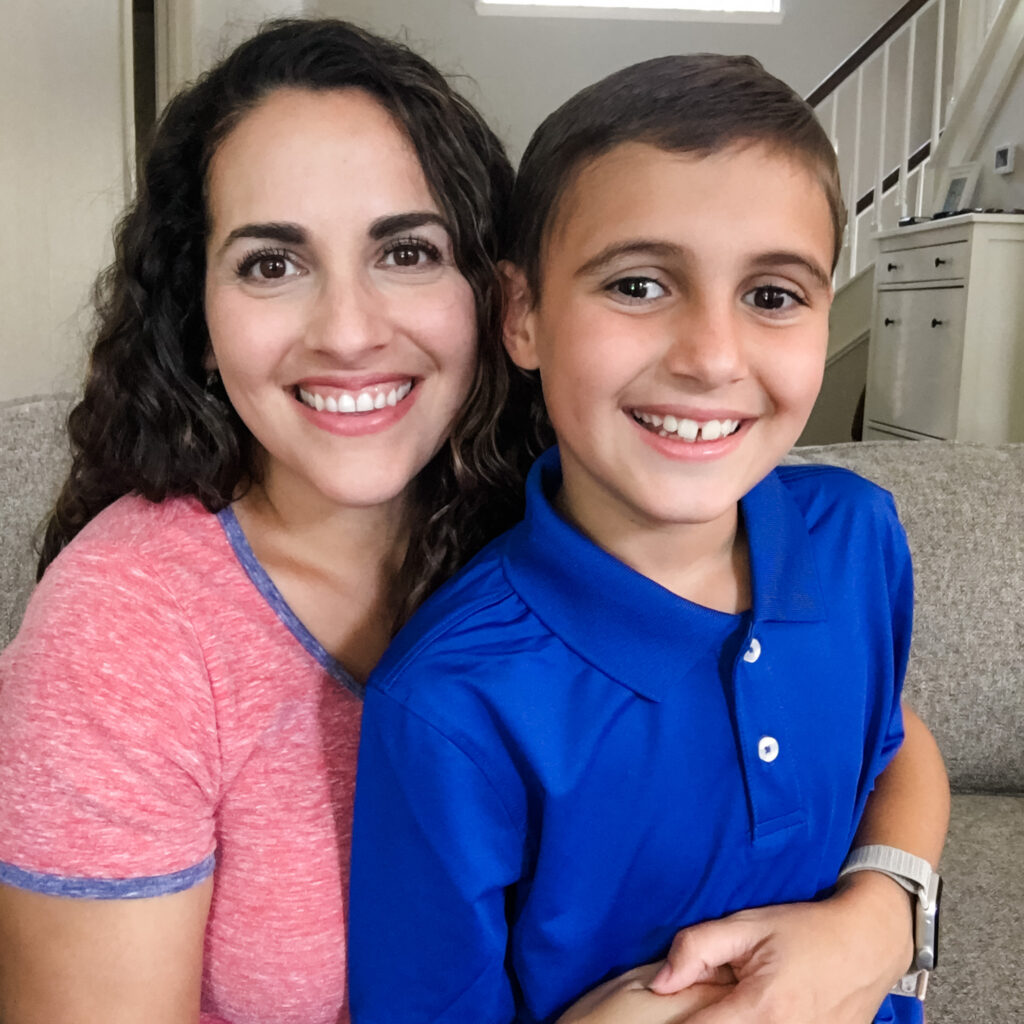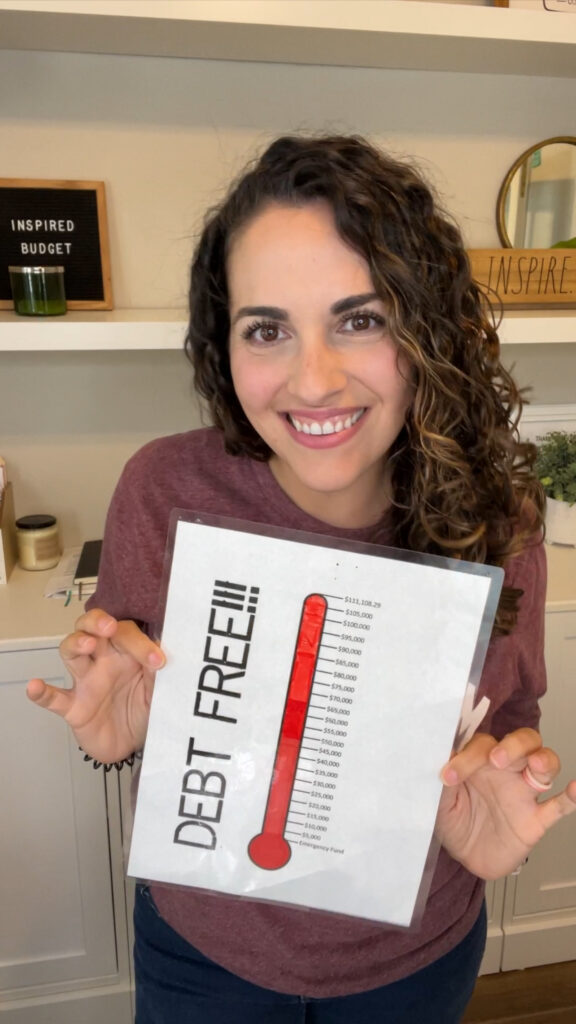When our youngest son, James, was three years old, he had what we assumed was a simple stomach virus. My husband and I kept him home from daycare, cuddled with him all day, and did our best to help him get better. It wasn’t until the next day at 11:00 p.m. that my gut told me something else was wrong. This wasn’t just a stomach virus – it was something bigger.
I was lying next to him in bed while he slept. I placed my hand on his chest. His heart was racing. My medical knowledge extends to watching several seasons of Grey’s Anatomy, so I’m not a medical expert by any means. But I knew at that moment he needed to see a doctor immediately.
I loaded my sweet toddler into the car, grabbed my purse, and took him straight to the hospital by our home. I hoped the ER doctor would tell me I was overreacting and send us right back home.
Boy, was I wrong.
After multiple blood draws and one inconclusive ultrasound, James and I were granted a ride on an ambulance to the Children’s Hospital in Dallas. We arrived at 4:00 a.m., and by this time my sweet boy seemed lifeless and couldn’t even sit up. The doctor ordered James a CT scan. The results were terrifying.
Not only did he have appendicitis, but his appendix had ruptured. James had developed peritonitis, which means his entire belly was filled with infected fluid from his ruptured appendix. Peritonitis can be very serious and can even cause death if not treated right away.

His intestines and some organs not only slowed but had completely stopped working. They were frozen and in shock from the infection filling his abdomen.
I was laying in the hospital bed next to him when the nurses rushed into the room and declared that he needed to go into surgery immediately.
Two nurses swiftly lifted James’s small and unmoving body onto a gurney and quickly wheeled him toward the elevator. I ran to catch up with the nurses and held James’s hand as he entered the pre-op room.
My husband and I were taken to an empty waiting room. Time stood still. I don’t know how many minutes or hours had passed, but I felt like we were waiting a lifetime to hear from the pediatric surgeon. We prayed for a successful surgery and hoped for good news.
Eventually, the doctor walked into the room and took a seat across from us. I’ll never forget the look on his face.
He leaned forward and rested his elbows on his knees. With both hands clasped together, he looked straight into our eyes and told us that our son was in critical condition.
We were led to the ICU, where James was sleeping, fighting the infection in his body. Thankfully, the antibiotics they had given him to fight off the infection did their job.
The aftermath of his surgery and infection were incredibly miserable. He was on pain medicine around the clock and couldn’t eat or drink anything. He had a feeding tube in his nose, and IVs surrounded his body. Slowly, James healed and became stronger over the next week.
The surgeon was very concerned for James. He told us we would be in the hospital for a minimum of three weeks. Our three-year-old son had hundreds (if not thousands) of people praying for him during this time. To the doctor’s surprise, we walked out of the hospital seven days later with a prescription for antibiotics and a follow-up appointment scheduled.

I’m not going to lie…I’m extremely thankful I was able to focus on our son during those tiring and stressful days instead of the bills that were certainly piling up.
By this time, we were debt free and had about $15,000 in our savings account to cover any emergencies.
Our emergency fund brought us peace of mind during this stressful time. We didn’t know if we would be able to pay for all our medical bills, but I knew our savings account would help cover some of the cost of this entire experience.
Emergencies happen. It’s not a matter of if they will happen but when emergencies will happen. While we can’t tell the future, we can do our best to prepare for whatever life throws at us. It all starts with having an emergency fund in place.
Why You Need An Emergency Fund
Dealing with my son’s appendix crisis was a huge emergency, both on an emotional and financial level. Many emergencies are smaller, but you still need to be ready for them.
Emergencies can include car or home repairs, sudden changes in your income level, unexpected litigation, or any of a range of events. Even something that seems like a relatively minor, everyday event can quickly turn into an emergency, as happened with our dog Joey.
While my husband and I were working to pay off $111,000 of debt, our dog at the time jumped a chain link fence and injured his foot. Matt immediately took him to an emergency vet. Little did we know, the vet wrapped Joey’s leg too tight and didn’t prescribe him a strong enough antibiotic to fight off infection.
Days later we removed Joey’s bandages and noticed that his leg looked dull and lifeless. We took him to our personal vet and learned that Joey had developed a terrible case of gangrene in his leg.
Essentially, his leg was dead, and the gangrene was creeping up his body. If we wanted to save Joey’s life, he would need his leg amputated as soon as possible. At that time, we had $4,000 in our emergency fund. The vet told us his surgery would cost about $3,000 total.
Joey’s surgery was a shock to our family, but we were incredibly grateful that we had money in an emergency fund to cover the cost.
We didn’t have to go into debt to save his life.

We didn’t have to take four steps back when it came to our money goals.Instead, we were able to focus on helping our sweet “tripawd” (a three-legged dog) get better!
Our emergency fund served us with our dog Joey just as it did with our son, James.
Your emergency fund has one sole purpose: to help cover any unexpected expenses so you don’t have to go into debt to pay for them.
As you’re working to become debt free and manage your money better, the last thing you want to do is go into debt when an emergency arises.
That’s why setting up an emergency fund is imperative to your financial health. Emergencies catch us off guard, can cause us to go into more debt, and increase the stress in our life.
By setting up an emergency fund for your family, you’re taking a proactive approach to facing life’s unexpected expenses head on.
What Your Emergency Fund Should Cover
I once tried to convince my husband to take me on a beach vacation using our emergency fund. As a teacher with summers off, it was difficult to scroll social media and witness everyone else enjoying the wonderful vacations that I longed for.
My husband was teaching summer school at the time, but I knew we could swing a four-night trip. I had calculated the cost, and we had just enough money to pay for the entire trip if we used our emergency fund.
Thankfully, Matt, who has way more self-control when it comes to money than I do, stood strong and kindly reminded me that beach vacations are not actual emergencies.

Over the years, my husband and I have used our emergency fund for many things including surgery for my son (twice!), vet visits, a new transmission for my husband’s car, plumbing issues in our home, and plenty of unexpected medical bills.
Over the years I’ve been tempted to use our emergency fund on countless vacations, new furniture, unnecessary home updates, and anything else that caught my eye.
Your emergency fund is for just that: emergencies. But what qualifies as an emergency? In the moment it can sometimes be hard to determine if the cost you are facing is a want or a need.
A good rule of thumb is to save your emergency fund for surprise medical bills for both people and animals, necessary car or home repairs, and expenses after a job loss.
Expenses such as gifts, vacations, furniture, and entertainment do not qualify as an emergency, even though I sometimes want them to!
How Much Should Be In Your Emergency Fund?
A good goal is to save three months of necessary expenses in your emergency fund. We only include necessary expenses in your emergency fund because if needed, you can cut back on unnecessary expenses temporarily.
While it might be tempting to include Netflix or your favorite subscription as a necessary expense, those likely won’t make the cut. Once you’ve identified which expenses are necessary, it’s time to calculate how much you’ll need in your emergency fund.
How To Calculate Your Emergency Fund
Calculating your emergency fund can be simple and straightforward.
Follow the steps below to find out how much money should be in your emergency fund.
1. List out all your monthly expenses and how much they cost;
2. Highlight the necessary expenses;
3. Add the necessary expenses together; and
4. Multiply the total number by three.
For instance, let’s say a family has $4,500.00 each month of necessary expenses. This means they would need to save $13,500.00 for a three-month emergency fund.
A little shocking, right? I personally was taken aback the first time I saw our family’s emergency goal number. That’s a lot of money to save!
Yes, it might take you a while to save your emergency fund. But I can promise you that when you need the money, you’ll be thankful to have your emergency fund cash sitting in savings to cover any expenses such as major car repairs, unexpected medical costs, or even a job loss.
You Used Your Emergency Fund: Now What?
In October 2021 our beloved dog Joey, passed away. We had been faced with a few emergency expenses the month before, so we were actively working to refill our emergency fund when he died.
Between the vet bills, biopsies, blood work, and cremation expenses, we were hit with more setbacks when it came to replenishing our emergency fund.
Can I be real here? Sometimes emergencies and setbacks like this make me want to give up. I start to think, “Why bother trying? Something always goes wrong.” But then I remind myself that while I can’t predict what life will bring (including the expenses that come with it), I can do my best to set my family up for success.
So I did what I needed to do: I continued to focus on refilling my emergency fund once again. I told myself that I don’t have to feel ashamed, guilty, or frustrated when I’m in a position to use my emergency fund.
It’s easy, and totally normal, to feel guilty for using money from your emergency fund. You’ve worked hard to save that money. When you end up using it to cover unexpected expenses, it can feel like a loss—literally.
But it only feels this way because you have money goals that you’re working toward. When life happens, sometimes we have to put our goals on pause. This journey won’t always go as planned—and it won’t always look like how you pictured it would.
Instead of being frustrated or sad that you had to use your emergency fund to cover expenses, tell yourself that your money is doing what it needs to do at this moment. If you’ve built it up once, you can do it again.
Once you’ve used your emergency fund, the goal should be to replenish it as soon as you can. You can do this in several ways:
- Pause any extra payments to debt and send all extra money to your emergency fund;
- Sell any unused items around your home;
- Cut back on extra spending; and
- Make extra money.
The sooner you refill your emergency fund, the sooner you can work toward your other money goals!
What to Do When Your Emergency Fund Isn’t Enough
But what if you have an expense that’s just too much? Maybe you don’t have enough money saved in your emergency fund to cover the unexpected expense that you’re faced with. In this moment, you might feel defeated, but remember that you always have choices open to you. Sometimes we just need to dig a little to find them.
When life’s emergencies and unexpected expenses arise, it’s best to have a plan in place for how to handle them.
Here’s a checklist for what you can do when your emergency fund doesn’t cover the cost of your emergency:
- If possible, get a second opinion or quote. Do your research to get a fair price.
- Pause any extra debt payments. When emergencies arise, it’s okay to only make the minimum payments on your debts so you can focus on covering your expenses. Save any extra money you can find.
- Cut back on spending. There will be seasons of sacrifice in your life, but they are just that: seasons. Cutting back on your spending even for just a season allows you to save more money for your emergency expense.
- Increase your income. If you can, find a way to make more money, even if it’s just temporarily. You can do this by selling unused items around your home, taking on a side hustle, or requesting more hours at work. The extra money you make can go toward your emergency expenses or emergency fund.
- Negotiate your bill. Some doctor’s offices and hospitals are willing to offer a discount if you pay in full. Ask for a discount, and negotiate your bill.
- Set up a payment plan. If you have a medical emergency, many hospitals are willing to work with you to set up a no-interest payment plan. This way, you pay your bill over time but don’t end up paying interest to the hospital.
- Seek out financial assistance. Hospitals also have financial assistance programs. Ask the billing department about them. If you qualify, this could save you hundreds, if not thousands on your medical bills.
If you’re faced with an unexpected expense that costs more than the amount of money you have in your emergency fund, don’t be discouraged. Do what you can to cover the cost and then refill your emergency fund as soon as possible.
Your Emergency Fund: The Bottom Line
When it comes to your money, I personally believe that setting up your emergency fund should be the first thing you tackle. You’ll be thankful that you have it in place when you’re faced with unexpected expenses.
Remember, your emergency fund safeguards your money and finances so that you can still work toward your money goals.

